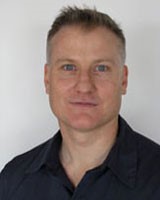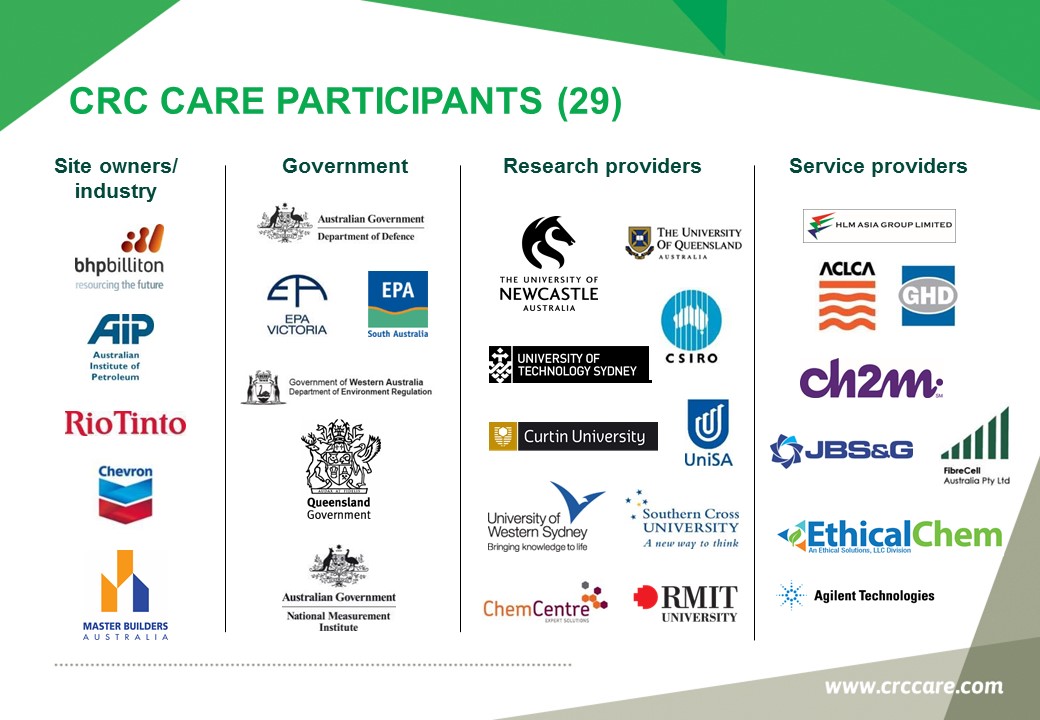 Sell tickets and manage registrations
Sell tickets and manage registrations
 View my tickets and registrations
View my tickets and registrations
 Sell more tickets through digital marketing
Sell more tickets through digital marketing
 Add an event calendar to your website
Add an event calendar to your website
 Find events by location and categories
Find events by location and categories
CRC CARE Workshop (Melbourne): Societal Perceptions and Acceptance of Remediation Technologies

CRC CARE Workshop (Melbourne): Societal perceptions and acceptance of remediation technologies – Using evidence-based knowledge to improve engagement with communities
This course can be used towards continuing professional development (CPD) points*
Overview: How do communities perceive and accept technologies that are used to remediate contaminated sites in their local area?
An increasing diversity of technologies are being used to remediate contaminated sites, yet there remains little understanding of the perceptions and acceptance that residents living near these sites hold for these technologies, and what factors affect their perceptions and acceptance of these technologies. This lack of understanding hinders the remediation industry’s ability to effectively engage with these residents, at a time when such engagement is becoming part and parcel of remediation policy and practice. This two-day workshop will draw on new insights, collected from more than 2000 residents living near 13 contaminated sites across Australia, to provide attendees with knowledge that will support more effectively engagement with residents based on their perceptions and acceptance of technologies. This interactive workshop seeks to open the ‘black-box’ of community engagement by revealing and discussing the experiences of those residents.
At the conclusion of the workshop, attendees will have a detailed awareness of residents’ perceptions and acceptance of technologies, what factors are most likely to affect residents’ perceptions and acceptance, and how to engage with residents based on their perceptions and acceptance. Furthermore, attendees will gain a detailed awareness of how residents worry, perceive risks, perceive benefits about remediation technologies and their support and preference for remediation technologies.
To maximise the learning potential of the group, attendees are encouraged to participate in group exercises and share their knowledge and experience. Attendees throughout the workshop will be involved in small group case study exercises using the skills and information obtained during Day 1 and Day 2 of the workshop.
Day 1: Workshop topics will include
- Introduction: Why engage with residents’ perceptions and acceptance of technologies? The evidence base supporting the workshop; the policy context
- The technology acceptance spectrum; what factors affect residents’ levels of support for remediation technologies?
- How do residents negotiate their level of support for remediation technologies? Social licence to operate, and resident sanctions
- The relationship between residents’ perceived risks and benefits of remediation technologies; risk and benefit types which residents associate with remediation technologies; how residents weigh-up risk and benefit types
- What factors affect residents’ levels of perceived risk of remediation technologies?
Day 2: Workshop topics will include
- What factors affect residents’ perceived levels of benefit from remediation technologies?
- What worries residents about remediation technologies?
- The impact of worry on residents’ cognitions, emotions and wellbeing
- What factors affect residents’ worries and concerns about remediation technologies?
- How do residents’ worries about remediation technologies differ from their worries about the contaminant
- Where and when to consider resident’s perceptions and acceptance in remediation policy, planning and implementation.
Who should attend
The workshop will be of interest to regulators, local government officers, industry professionals and consultants with or without prior experience in community engagement. It draws on a new evidence base that provides insights into how Australian communities perceive and accept the application of remediation technologies in their local area.
Schedule
Day 1
8.30AM – 9.00 AM Arrival
- Coffee / tea on arrival
- Attendees find their name badge and workshop registration package
9:00 AM – 9:30 AM Welcome and introduction
- Trainer will give overview of experience
- Hear from attendees of their experience
- Outline the objectives for the workshop
- Hear what the attendees wish to get out of the workshop
- Health and safety matters including emergency procedures and nearest washrooms facilities
9:30 AM – 10:00 AM Overview
- Why engage with residents’ perceptions and acceptance of technologies?
- The Extensive Australian evidence-base underpinning the workshop
- The value of using an evidence-base to support community engagement: What constitutes evidence?
- Residents’ understandings of remediation technologies
- Australian and International policy context
10:00 AM – 10:30 AM Group exercises
10:30 AM – 10:45 AM Morning break
10:45 AM – 11:30 AM Acceptance of remediation technologies
- The technology acceptance spectrum
- What factors affect residents’ levels of support for remediation technologies?
- Evaluating residents’ preferences for remediation technologies
11:30 AM – 12:15 PM Group exercises
12:15 PM – 1:15 PM Lunch Break
1:15 PM – 1:30 PM Recap
1:30 PM – 2:00 PM Negotiating acceptance of remediation technologies
- How do residents negotiate their level of support for remediation technologies?
- Social Licence to 0perate, and resident sanctions
2:00 PM – 2:30 PM Group exercises
2:30 PM – 3:00 PM Perceived risks and benefits about remediation technologies
- The relationship between risk and benefit perceptions
- Risk and benefit types residents associate with remediation technologies
- Balancing risk and benefit types
3:00 PM – 3:15 PM Group exercises
3:15 PM – 3:45 PM Afternoon tea break
3:45 PM – 4:15 PM Perceived risks
- What factors affect residents’ levels of perceived risk of remediation technologies?
4:00 PM – 4:30 PM Group exercise and open forum where attendees can generate discussion and ask questions
4:30 PM – 4:45 PM Take-home material
- Explaining documents on the USB drive
Day 2
8:30 AM –9:00 AM Arrival
- Coffee/tea on arrival
- Attendees find their name badge and workshop registration package, take their seat
9:00 AM – 9:15 AM Welcome and introduction
- Trainer to give overview of experience (if new participants attend)
- Hear from attendees of their experience (if new participants attend)
- Outline the objectives for Day 2 of the workshop
- Hear what the attendees wish to get out of Day 2
- Health and safety matters including emergency procedures and nearest washroom facilities
9:15 AM – 9:30 AM Recap on day 1
- Interactive forum providing a re-cap on topics learnt during Day 1. This will enable trainer to get an understanding of participants’ level of knowledge
9:30 AM – 10:00 AM Perceived benefits
- What factors affect residents’ perceived levels of benefit of remediation technologies?
10:00 AM – 10:15 AM Group exercises
10:15 AM – 10:45 AM Morning break
10:45 AM – 11:15 AM Residents’ worries and concerns about remediation technologies
- What worries residents about remediation technologies?
- The impact of worry on residents’ cognitions, emotions and wellbeing
11:15 AM – 12:00 PM Group exercises
12:00 PM – 1:00 PM Lunch Break
1:00 PM – 1:30 PM Residents’ worries and concerns about remediation technologies cont…
- What factors affect residents’ worries and concerns about remediation technologies?
- How do residents’ worries about remediation technologies differ from their worries about contaminants?
1:30 PM – 2:00 PM Group exercises and re-cap
2:00 PM – 2:45 PM Using residents’ perceptions and acceptance in remediation policies and planning
- Where and when to consider resident’s perceptions and acceptance in remediation policy, planning and implementation
- Remediation policy
- Remediation planning
- Community engagement planning
2:45 PM – 3:00 PM Afternoon tea break
3:00 PM – 3:45 PM Group exercises
3:45 PM – 4.30 PM General Discussion
- Summary
- Explaining documents on the USB drive
- Open forum where attendees can generate discussion and ask questions
Presenter

Associate Professor Jason Prior, PhD,
Research Director, Institute for Sustainable Futures, University of Technology Sydney
Dr Jason Prior has more than 10 years’ research experience in the management and remediation of contaminated sites, and specialises in improving the contaminated site industry’s ability to engage with those stakeholders, in particular residential communities, affected by contamination sites and their remediation. This workshop is based on evidence from a recently completed 5-year research project led by Dr Prior, which was designed to address the current research gap in community perceptions and acceptance of the growing diversity of technologies that are being used to remediate contaminated sites. The research provides what has been described as the most detailed account extant of how residents perceive and accept remediation technologies. The 5-year research project involved 2953 residents, including 2009 living near 13 contaminated sites across Australia, and was funded by the Cooperative Research Centre for Contamination Assessment and Remediation of the Environment. This research was developed in partnership with Australian Environmental Protection Authorities, and other national and international industry representatives.
Dr Prior is an Associate Professor, Research Director and Deputy Director of Postgraduate Program at the Institute for Sustainable Futures (ISF), University of Technology Sydney (UTS). Dr Prior joined ISF in October 2008, after a three-year engagement as a Research Fellow at the Faculty of Design, Architecture and Building at UTS. Dr Prior received his PhD from the University of New South Wales, and is a registered architect and planner. He has led over 20 research projects with a particular focus on equity, vulnerability and resilience. The research has been carried out in Australia, France, Italy, People’s Republic of China, the United States, Canada and the United Kingdom, and arises through collaboration with national and international research institutions, government, industry, communities, and the spatial professions. Dr Prior’s research has been published widely. He is currently leading a NSW Environmental Trust project which seeks to improve engagement planning within the NSW contaminated site context.
Location
Hotel Grand Chancellor Melbourne
131 Lonsdale Street, Mebourne VIC 3000
Cost
-
One day - AUD $ 695 (ex GST)
-
Two days - AUD $ 1,095 (ex GST)
10% off for employees of CRC CARE Participant organisations and subscribers to Site Contamoination Practitioners Australia.
To obtain a discount code for this workshop, please contact one of the following:
- Your company representative to CRC CARE
- Ratin Mathur (ratin.mathur@crccare.com / 08 8302 3933)
Refund policy
Attendees can receive refund up to 7 days before the event start date. Admin fee of $100 will apply.
*Please check with your certification scheme re CPD points.
CRC CARE Participant organisations


